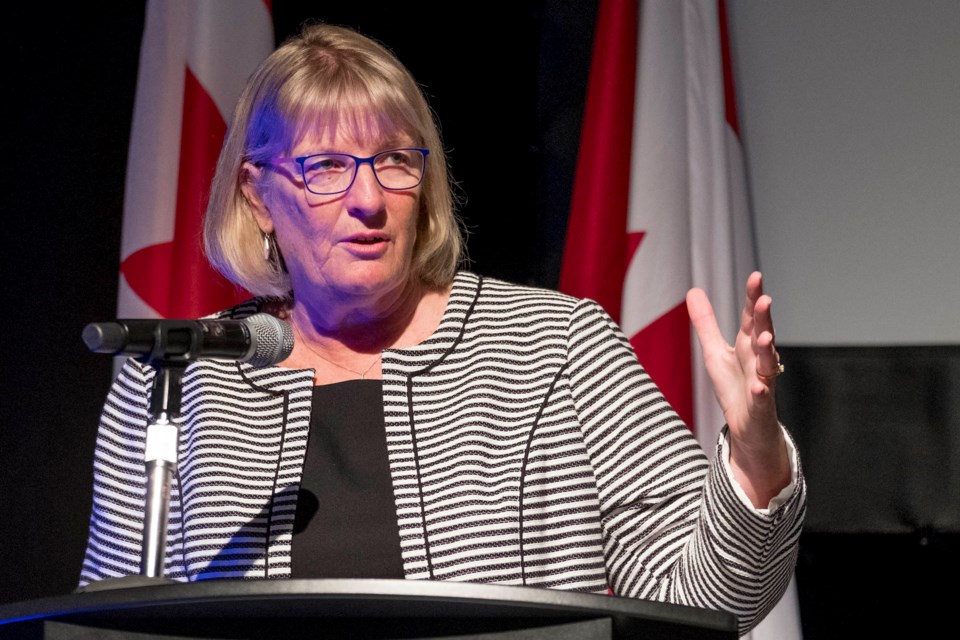Mothers who have lost kids to opioid overdoses are hoping a federal bill proposed to create a national strategy and decriminalize illegal substances will come to fruition.
Sen. Gwen Boniface of Orillia introduced Bill S-229, which is expected to have its second reading in the coming weeks. The bill would mandate that the minister of health work with political colleagues in health, public safety, and justice to create a health-centred national strategy to decriminalize illegal drugs.
Trafficking and possession for the purpose of trafficking would still be criminal offences.
The bill would also require consultations to help guide the national strategy and that the minister create a report within two years to be presented to Parliament.
Boniface has had conversations with Dr. Jeff Turnbull, who has been working to support homeless people and those dealing with drug addiction in the ByWard Market area of Ottawa. When they discussed how addiction affects people, Boniface took a greater interest in looking at the matter from a public policy perspective.
When the Canadian Association of Chiefs of Police called on the feds to decriminalize personal possession of illegal substances, she knew the time had come to take action in the Senate.
“I thought, ‘We’re really coming to the point where we’re really getting a meeting of the minds,’” she said of the acknowledgement that drug use should be viewed as a health issue rather than a criminal one.
The police chiefs association isn’t the only group making that recommendation. Others include the Canadian Public Health Association, the Canadian Mental Health Association, the Canadian Nurses Association and the Canadian Drug Policy Coalition.
With the opioid crisis only growing across the country, “this is the time that we need to have a really good debate,” Boniface said.
While a national strategy would be unique to the needs in Canada, she is encouraged by the situation in Portugal. That country decriminalized personal possession of all drugs in 2001, and reports have shown a decrease in drug use.
When it’s treated as a health issue, many people “don’t veer that way as much,” Boniface said.
She hopes Bill S-229 will result in additional support for people with addictions. That’s why she sees the national strategy as the “most important” part and why the bill mandates a strategy before decriminalization.
“I feel for the people on the frontlines who are doing everything they can” but lack sufficient resources, she said.
Kathy Cole is well aware of the gaps in the system when it comes to support. Her daughter, Erika, died of an accidental opioid overdose in 2018 at age 32. She wanted to get help, but no rehab beds were available in the province unless the family could pay $30,000.
“It’s really heartbreaking when you can’t access help when your loved one is ready for it,” Cole said. “Erika was trying to feel better.”
Regarding Bill S-229, she said, “It’s time.”
“Nothing else has been working. We really need to have this bill in place, accepted and acted upon,” she said.
Action should be taken in the meantime, she added.
“We need harm reduction and safe supervision like they’ve been doing out west,” she said.
Evelyn Pollock agreed.
“It’s a huge thing and it takes time,” she said of the bill, “but we don’t have time.”
What’s needed now is “a mindset shift.”
“We need people to understand what decriminalization means and what the impact is on people with substance abuse disorders. They risk death daily because they could have toxic substances in the drugs,” she said.
Pollock’s son, Daniel, died of an accidental overdose in 2017. He was 43.
He was homeless and had spent time in jail after being picked up for panhandling. If he didn’t show up for court, he went back to jail.
“Not once did they offer him any treatment,” said Pollock, who lives in Oro-Medonte.
The mindset shift needs to happen at all levels, she said, from individual citizens to police and judges.
“They have to believe that they shouldn’t be called criminals,” she said. “You have to take some money out of policing and put it toward health care.”
Pollock hopes Bill S-229 becomes a reality, especially since it aims to provide more support for those with addictions.
“Decriminalization means court diversion. It means more treatment, more money for treatment, research into ways to stop cravings,” she said. “These are people with health issues who need treatment, not jail time.”
Pollock is glad Boniface is the bill’s architect because of her experience with the issue.
Boniface was commissioner of the OPP 15 years ago.
“At that time, I would have had a harder view than I have now,” she said of her position on decriminalization, but added evolving science and societal views “influenced where I find myself today.”
She also worked as an organized crime expert with the United Nations, focusing on organized crime in West Africa. That experience also led her to think “maybe we need to think of this from a health perspective as a country.”
Boniface hopes Bill S-229 will at least generate discussion about the opioid crisis at a time when the focus of many is elsewhere.
“If it weren’t for the pandemic right now, I think this would be on the front pages and debated far more,” she said.
Despite the distractions brought on by COVID-19, the opioid crisis continues to devastate people and families from all walks of life.
Boniface noted there were 1,517 apparent opioid toxicity deaths in Ontario in 2019. In the first nine months of 2020, there were 1,693.
In the 15 weeks following the province’s declaration of a state of emergency, there was a 38.2 per cent increase in apparent opioid-related deaths.
In 2019, about 75 per cent of all opioid-poisoning deaths involved fentanyl.
“If that’s not enough to start a conversation, I don’t know what is,” Boniface said.
